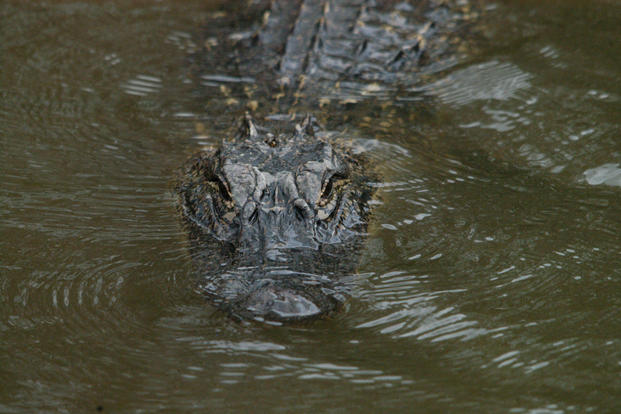Amphibious landings aren't uncommon at Marine Corps installations, but one spotted this week prompted officials to issue a safety warning to base dwellers.
An alligator's proximity to the barracks on Schmidt Street at Marine Corps Air Station New River, North Carolina, caught officials' attention. In a video posted to the Jacksonville air station's Facebook page, the gator moves out of the water and toward the camera when a hand can be seen throwing a piece of grass its way.
"Unfortunately, people have been actively feeding this alligator," the post states.
And if Marines are tempted to continue feeding their air station's reptiles, they were given a clear warning: Don't even think about it.
"In addition to being illegal, feeding an alligator is dangerous and creates a safety issue if they become habituated to being fed by humans," according to the post, which was also shared by Camp Lejeune.
Wildlife personnel at New River regularly monitor storm ponds and other bodies of water, which is how they found the intruder -- a 5-to-6-foot gator living directly behind the barracks, said Kirk Kropinack, director of the air station's installation and environment department. Alligators have previously been found on base in parking lots, on roads and even on the airfield, he added.
This gator's behavior gave some cause for concern though, he said.
"It was tracking these officials as they approached the pond and started swimming toward them," Kropinack said. "… It is very likely that the alligator has been fed in the past by people visiting the pond."
It was not clear whether Marines in the barracks are believed to have been feeding the alligator.
Alligators lose their natural fear of humans when they're fed, making them more likely to approach people or get aggressive, according to a warning from nearby Wilmington. The behavior can be dangerous to alligators as well, it adds, since it sometimes forces them to be captured, relocated or even destroyed.
Department of Agriculture biologists and conservation law enforcement officers at New River were planning to capture the alligator and move it to a remote spot away from the barracks. The reptile is believed to have moved to an unknown location on its own, though.
The American Alligator is commonly found in coastal North Carolina. They can grow up to 11 feet long, weigh as much as 1,000 pounds and can live up to 50 years, according to the Smithsonian Institute. They're typically found in lakes, freshwater rivers, swamps and marshes.
Alligators near Lejeune and New River are most active in the beginning of spring and end of fall, Kropinack said. Each spring, his department starts an information campaign to warn the base population that feeding alligators is illegal.
New River and Camp Lejeune officials said anyone who believes and alligator is being fed or poses a safety concern should call 911 so wildlife personnel can be sent out to investigate.
Related Video:
-- Gina Harkins can be reached at gina.harkins@military.com. Follow her on Twitter at @ginaaharkins.












